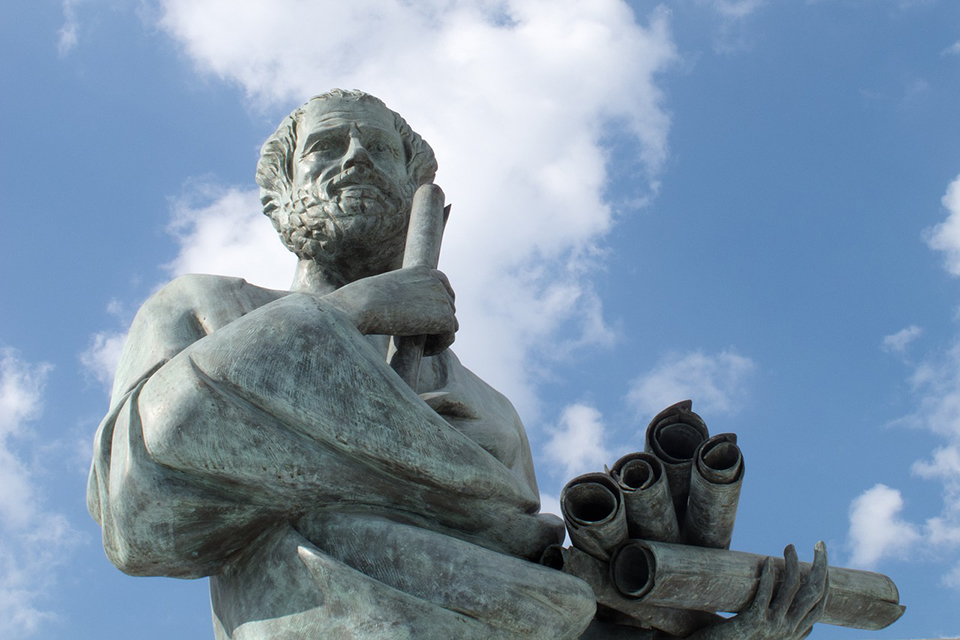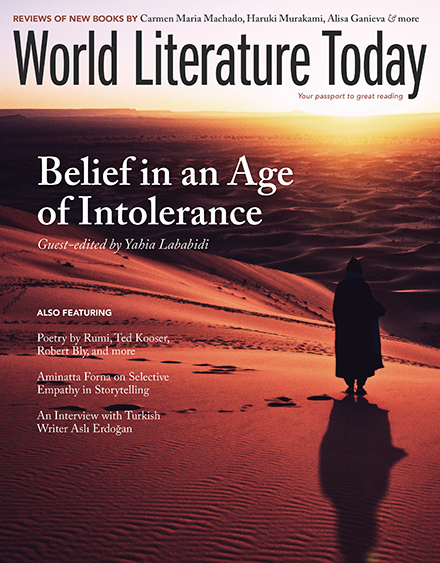The Trial of Socrates (an excerpt)

Using Socrates’ trial as his point of departure, the author spins out a meditation on wisdom, the divine, justice, grace, and desire like “an arrow in the chest.” “We cannot go backward any more than we can hide from the light,” he writes, “so we must make Eden where we are.”
Socrates told the court at Athens that there had been a voice, a god, with him, since childhood. This voice only told him what not to do. This voice turned him away from honors and from titles. This voice, he told the court at Athens, never once told him what he must do, it only told him what he must not do. There was very little uproar over this declaration, according to the accounting we have from Plato (who was in the courtroom), but over other declarations, much uproar.
A coterie of Socrates’ admirers was in attendance. The old man would not call himself their teacher. They followed him in the streets of Athens and exulted to watch as, with irony bordering on clairvoyant insight, he methodically deconstructed the false ideas of those who would engage him. Politicians and poets and priests, among them. The old man was an indubitable manifestation of inspired reasoning. Could not be got around, got over or gone under. Like the gate upon heaven.
The wisdom of Socrates, what made him the wisest of all, consisted of his knowing he was not wise. No one else was wise, either. Poets, priests, and politicians were just as unwise as Socrates. But, unlike these others, Socrates realized he was unwise. It was his recognition of this hair’s breadth of difference between himself and the other unwise that allowed Socrates to accept, with dignity, that burden the Oracle of Delphi had (with a well-publicized utterance) draped across his narrow, bony shoulders.
The Oracle at Delphi was an infallible seer of the time, who spoke for a god, and pronounced Socrates “the wisest of the Greeks.” Unfortunately, this also made wisdom into competition, of which Socrates had been declared the winner (thereby becoming the unfortunate beneficiary of incomprehension, envy, and scorn). Eventually the unasked-for honorific led to his prosecution and execution.
Incarnate divinities come and go. (But perhaps the word “divinity” makes this declaration hard to absorb?) Great souls, who have come from lives in other realms, to live in this world, come and go. Yes, that is a more palatable way to express it.
The divine is simply a realm in which the inhabitants are aware of themselves as children of the Universe, dwelling in timelessness. I do not know that this makes them better than inhabitants of realms who are not aware of themselves as such. I do know that children who know their parents feel more secure in themselves. And that this security allows them to grow and to flourish. Whether growth and flourishing are always desirable states, I also do not know. It seems to me the opportunities presented to us, in whatever circumstance we find ourselves, in whatever realm, are almost always opportunities to grow and to flourish, if we are able to take them rightly.
The divine is simply a realm in which the inhabitants are aware of themselves as children of the Universe, dwelling in timelessness.
X. often kept journals. Mainly to throw them out, it seems. Or, more recently, mainly to delete them. The journals are an ongoing document of the thoughts of X. This is reason enough to delete. As one kicks away a ladder upon having climbed to the roof. Or sets fire to a bridge, after one has crossed over upon it. So others do not make the same mistakes. There are as many ways to the roof as there are souls who desire to climb to it. There are as many ways to cross over as there are souls who desire to reach the far shore. Within each of us are bridges and ladders of every design. This is what the ladders and bridges utilized by previous, transcending and traversing, souls reveal. Not the way on, but that we have everything we need, already within us.
The tendency of every civilization is to privilege its normative aspects over those that are exceptional. This is the basis upon which its laws are developed. As civilizations differ, so do laws. Justice is one thing, and the law another thing. The law does not always catch up to the wrongdoer, but justice does. This is because every wrong is bound up with its restitution. We can’t do the one without conjuring the other.
The law does not always catch up to the wrongdoer, but justice does. This is because every wrong is bound up with its restitution. We can’t do the one without conjuring the other.
Our actions have consequences. Our thoughts and words have consequences. Our dreams and inspirations have consequences. Our gestures, our breath (the consequence of in-breath must be out-breath, for example), the beatings of our heart, all have consequences. And, moreover, all ARE consequences.
Socrates spoke of his channel to the divine. Not in so few words, of course. He spoke of it constantly, and prolifically. “The god,” he called it. The god’s oracle, at Delphi, had called Socrates out by name. “I knew I was not wise,” offered Socrates. “I also knew the gods do not dabble in paradox.”
To the tip-top of that steppe called one’s life, one pushes, or drags, or carries, or pulls, all the knowledge one has accrued over the course of that life. But then what? If my knowledge and the world to which my knowledge applies are now to be in two separate places? Return to that world in which my hard-won knowledge applies, start over with it, and perhaps turn it to better account, this time? Make something more of it? And by doing so, make something more of myself? Or let it all go (stop filling and emptying the bucket, over and over; simply drop the bucket, by the side of the well) and carry on empty-handed?
Faced with a life in the spirit realm, all our unmet human desires rise up and cry out for one last opportunity to make good on their promises. Those who have NEVER opposed their own desires will have a hard time of it. Those who have learned (some) discipline over their desires will nonetheless be overwhelmed almost immediately by the fury and surety with which these desires present the arguments for their survival. “What will you really have,” they ask, “without us?”
Desire is nothing. A shadow, fleeting, in a land of shadows. It is our actions that give body to those desires. That is why they woo us so desperately. That is why they almost seem to need us more than we need them.
Desire is a birdsong in a forest flush with birdsong, now here, now there.
What we don’t want to learn, we learn very slowly, and only after many painstaking repetitions of effort. Desire teaches what we don’t want to learn. If we were to accept the lessons of desire, in their pure essence, we would know, soon enough, everything of crucial importance to the prospect of our long-term happiness. How desire gets mixed in with reason and veils direct perception. How desire eclipses attention, disrupting optimal cognition. How desire weeps shamelessly and goes begging. How it lies when it tells of its kingdom.
Then I saw, as through a glass darkly, but now I see clearly. The kingdom of desire is a kingdom of straw inside a tinder-box.
“But what have I without my desire?” the student asks. “I expect you mean, ‘How am I to live?’” replies the teacher. “I expect you mean, ‘With what shall I replace that desire?’” “Yes,” agrees the student. “If I have an arrow in my chest and the surgeon draws it out of me, do I ask, ‘With what shall I replace that arrow?’ Or do I simply express gratitude to the surgeon, accept the scarring as a symbol of transformation, and go on without expectation? Especially considering the replacement for an arrow in the chest must inevitably be another arrow in the chest.”
The foundation of lyricism is loneliness. The foundation of loneliness is desire. Let go desire and the loneliness will fall away (though so too will the lyricism).
A lonely person can easily become depressed. A depressed person can easily become overwhelmed. An overwhelmed person can easily fall to pieces.
To be born at a time, in a place, where good wisdom is unknown or untaught: this is a misfortune. Without access to wise teachings, one must remember all on one’s own. From the promptings of the moon and stars and rivers and stones. But what without the moon and stars and rivers and stones? How for the prisoner locked away from everything but the darkness of his cell?
Within us, the lives we have led. The rivers, the ranges we have crossed. Like the lines in the palms of our hands, these experiences are etched into us. It is a poor soul indeed who has not known something of grace, if only what it feels like to have lost it. From sorrow comes understanding. To the sorrowful come the saints.
It is a poor soul indeed who has not known something of grace, if only what it feels like to have lost it.
Adam and Eve and the Garden are in us. And the Fall from the Garden is in us. And we cannot go backward any more than we can hide from the light, so we must make Eden where we are, if we are to have any hope of returning.
There is a fable that tells how inside every potato are rivers and mountain ranges. And how inside every stone are eyes that would fain see the stars again, if they could.
There is a fable in which a many-eyed potato looks up into the many eyes of the night and wonders, “Is what I am seeing the skin of an enormous potato? And if so, how many worlds might that potato contain?”
A farmer is leading an ox. The ox is pulling a plough. The plough is carving furrows into which the farmer will sow seeds. The whole human endeavor revolves around variations on this scene.
Cry out and you will be heard. Keep silent and you will be given instruction.
Boulder, Colorado










